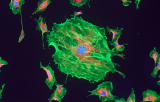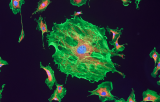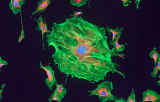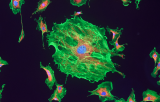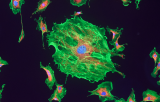
In situ hybridization probes - Kidney cancer
Renal cell carcinoma (RCC), also called hypernephroma, renal adenocarcinoma, or renal or kidney cancer, is a kidney cancer that originates in the lining of the proximal convoluted tubule, a part of the very small tubes in the kidney that transport primary urine. RCC is the most common type of kidney cancer in adults, Renal Cell Carcinoma (RCC) has the highest mortality rate of the genitourinary cancers and the incidence of RCC has risen steadily. If detected early, RCC is curable by surgery although a minority are at risk of recurrence. RCC is a fast-growing cancer and often spreads to the lungs and surrounding organs. Symptoms can include hematuria, flank pain, a palpable mass, and fever of unknown origin (FUO). However, symptoms are often absent, so the diagnosis is usually suspected based on incidental findings.


